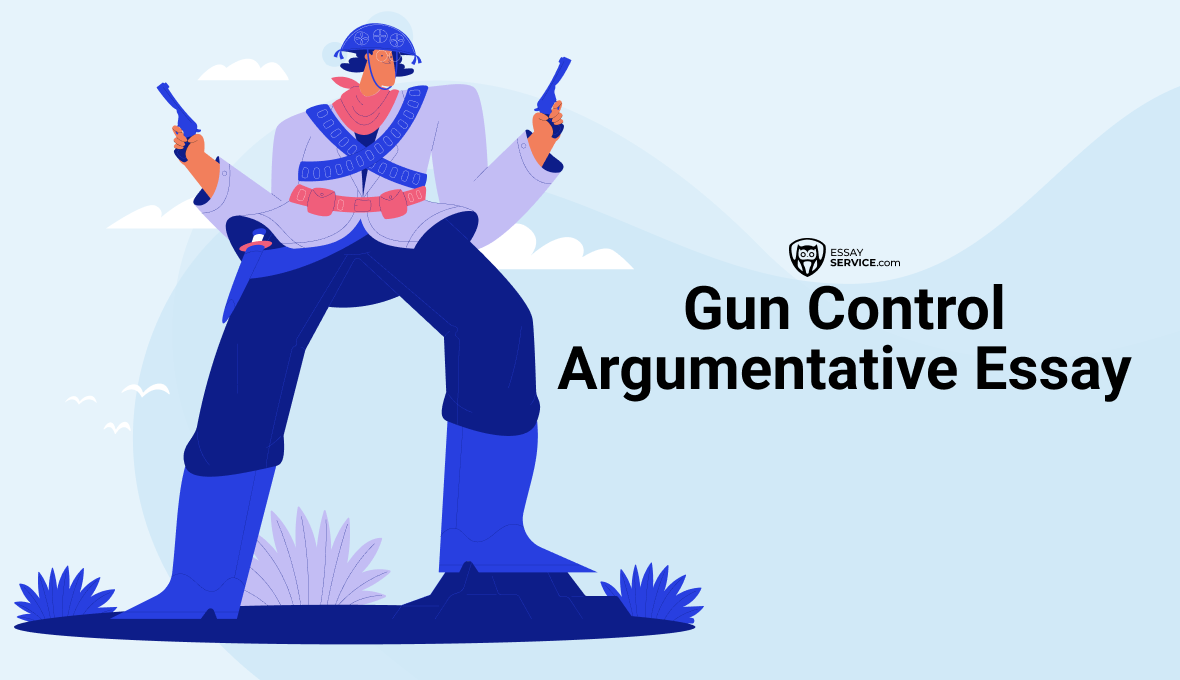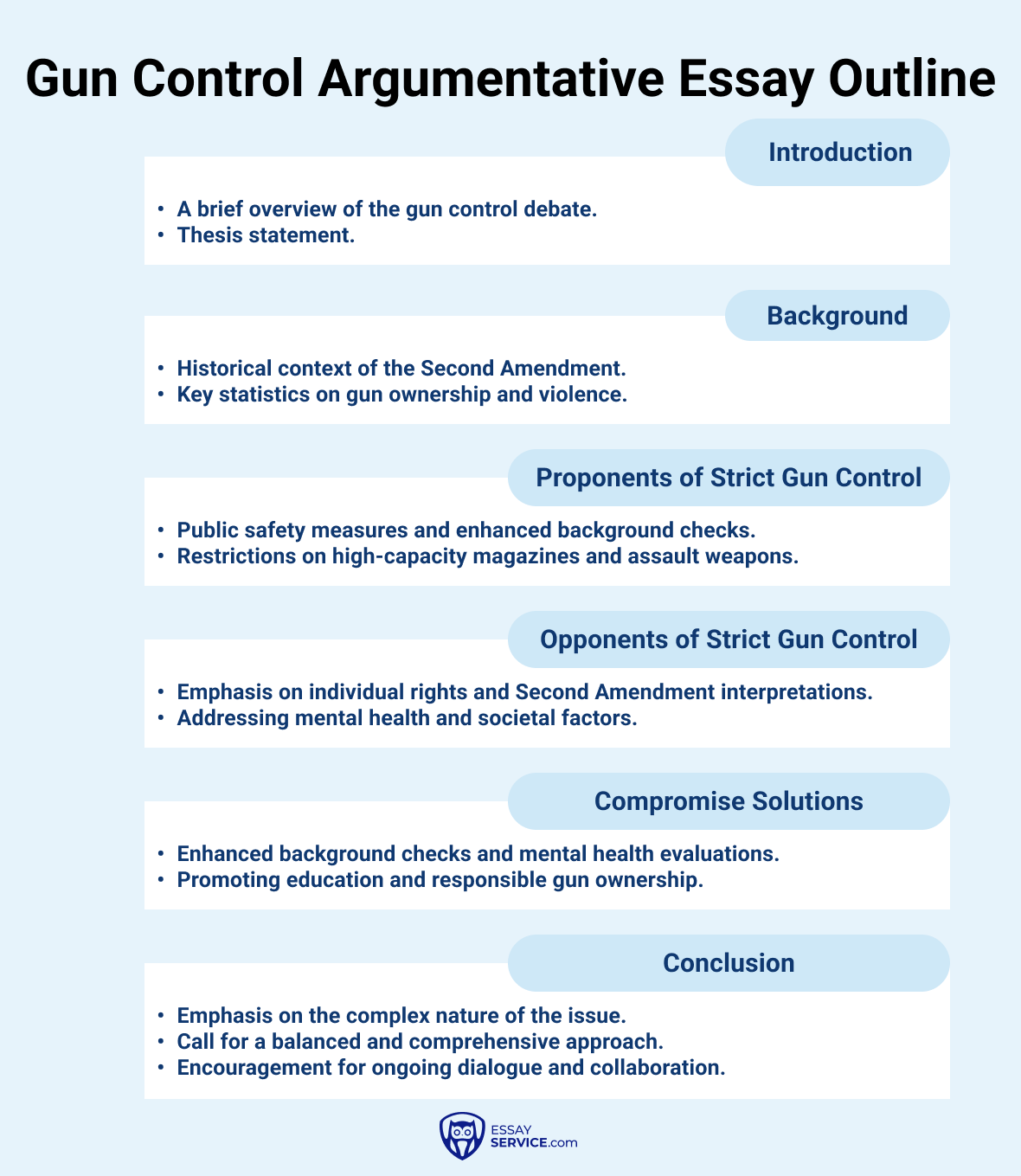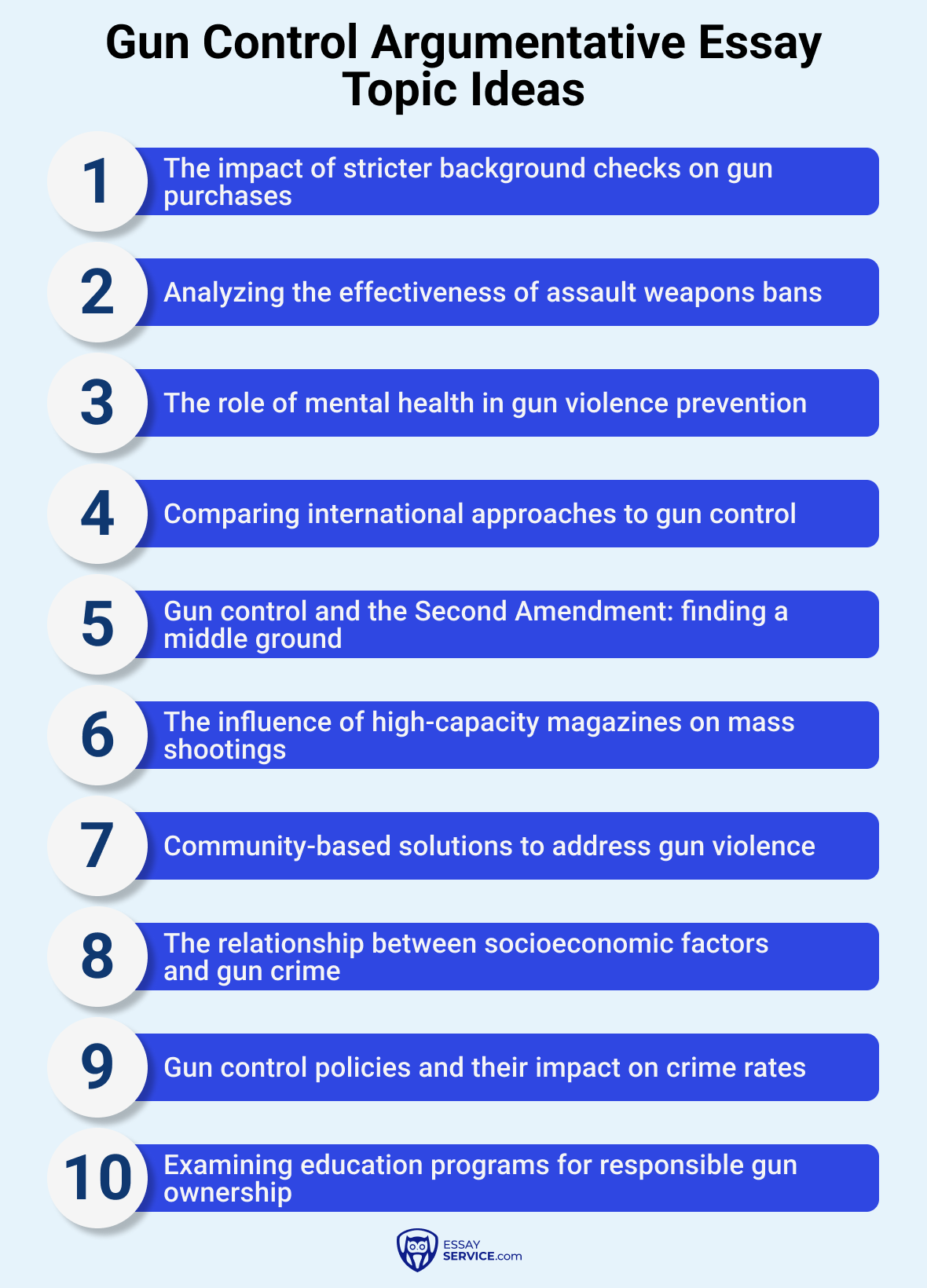
Gun Control Argumentative Essay: The Definitive Guide
What Is Gun Control?
Gun control refers to the regulation and management of firearms within a given jurisdiction. It involves the creation and enforcement of laws, policies, and measures aimed at restricting the possession, use, and distribution of firearms. The objectives of gun control vary, but they often include enhancing public safety, preventing gun-related crimes, reducing the likelihood of mass shootings, and addressing concerns about domestic violence.
Gun control measures can encompass a range of policies, such as background checks for gun buyers, restrictions on the types of firearms and accessories available for civilian use, waiting periods before obtaining a firearm, and limitations on the number of firearms an individual can own. Additionally, some jurisdictions may implement licensing requirements, mandatory firearm registration, and regulations regarding the storage and carrying of firearms.
Debates surrounding gun control often involve discussions about individual rights, constitutional interpretations (such as the Second Amendment in the United States), and the balance between personal freedoms and public safety. Advocates for gun control argue that it is necessary to curb gun violence and prevent tragedies, while opponents may emphasize the importance of individual liberties and the right to bear arms for self-defense.
Overall, gun control is a complex and contentious issue that involves finding a balance between protecting public safety and respecting the rights of individuals to own firearms.
How to Choose a Topic for Argumentative Essay on Gun Control?
Choosing an argumentative essay on gun regulation involves considering various factors to ensure that your topic is relevant and engaging, allowing for a thorough exploration of the issue. Here are some tips to help you choose a compelling argumentative essay topic on gun control:
1. Define Your Position
- Consider your stance on the issue. Are you in favor of stricter gun control measures, or do you argue for more permissive policies? Understanding your position will guide your topic selection.
2. Consider Current Events
- Look at recent news and developments related to gun control. Timely and relevant topics often generate more interest and provide an opportunity to engage with current debates.
3. Narrow Down the Focus
- Gun control is a broad topic. Narrow it down to a specific aspect or angle that interests you. For example, you could focus on the impact of gun control on reducing crime, the effectiveness of background checks, or the constitutional implications.
4. Research Available Data
- Ensure that there is enough research material available on your chosen topic. Access to credible sources and data will strengthen your argument and provide evidence to support your claims.
5. Consider the Audience
- Consider your target audience and choose a topic that resonates with their interests and concerns. Tailoring your argument to your audience can make your argumentative essay more persuasive.
6. Explore Both Sides
- Choose a topic that allows for a balanced discussion. Exploring both sides of the argument demonstrates a thorough understanding of the issue and can make your argumentative essay more nuanced and convincing.
7. Avoid Extreme Positions
- While it's important to have a clear stance, avoid overly extreme positions that may alienate readers. Aim for a topic that allows for a reasonable and well-supported argument.
8. Address Local or Global Perspectives
- Consider whether you want to focus on gun control at a local, national, or global level. Different regions may have unique challenges and perspectives on the issue.
9. Check Assignment Guidelines
- Ensure that your chosen topic aligns with the guidelines and requirements of your assignment. Check for any specific instructions provided by your instructor.
10. Personal Connection
- If you have a personal connection or experience related to gun control, it can add depth and authenticity to your argumentative essay. However, be mindful of maintaining a balanced and evidence-based argument.
By carefully considering these factors, you can choose a great argumentative essay topic on gun control that allows for a thorough exploration of the issue and engages your readers.
How to Write a Gun Control Argumentative Essay?
Writing a gun control argumentative essay involves presenting a clear and persuasive argument on the topic. Here's a step-by-step guide to help you structure and write your argumentative essay:
1. Understand the Assignment
- Before you start writing, make sure you understand the requirements and guidelines of your assignment. Know the purpose of your argumentative essay and any specific instructions from your instructor.
2. Choose a Strong Thesis Statement
- Develop a concise and specific thesis statement that outlines your main argument or position on gun control. This statement should clearly convey your stance on the issue.
3. Research Thoroughly
- Gather information from credible sources to support your argument. Look for data, statistics, expert opinions, and case studies related to gun control. Ensure that your research is balanced and addresses both sides of the issue.
4. Outline Your Argumentative Essay
- Create a well-organized outline to structure your argumentative essay. Divide it into an introduction, body paragraphs, and conclusion. Each section should have a clear purpose and contribute to the overall coherence of your argument.

5. Write a Compelling Introduction
- Start your argumentative essay with an engaging introduction that introduces the topic, provides background information, and ends with your thesis statement. Capture the reader's attention and set the tone for your argument.
6. Develop Strong Body Paragraphs
- Each body paragraph should focus on a specific point or aspect of your argument. Start each paragraph with a clear topic sentence and provide evidence to support your claims. Use examples, statistics, and quotations to reinforce your points.
7. Address Counterarguments
- Acknowledge and address opposing viewpoints. Anticipate counterarguments and refute them with strong evidence and reasoning. Demonstrating awareness of alternative perspectives adds credibility to your argumentative essay.
8. Use Clear and Convincing Language
- Write in a clear, concise, and persuasive manner. Avoid vague language and ensure that your arguments are logically presented. Use transition words to create a smooth flow between paragraphs.
9. Provide Real-Life Examples
- Support your arguments with real-life examples or case studies. Personal stories, historical events, or current news stories can add depth to your argumentative essay and make your points more relatable.
10. Conclude Effectively
- Summarize your main points in the conclusion and restate your thesis. Avoid introducing new information in the conclusion. End with a strong closing statement that leaves a lasting impression on the reader.
11. Revise and Edit
- Review your essay for clarity, coherence, and grammar. Check for any inconsistencies or gaps in your argument. Consider seeking feedback from peers or instructors to improve the overall quality of your argumentative essay.
12. Format According to Guidelines
- Ensure your argumentative essay follows the required formatting guidelines, including citation style (APA, MLA, etc.). Properly cite all sources used in your research.
By following these steps, you can craft a well-structured and persuasive gun control argumentative essay that effectively communicates your position on the topic.

Gun Control Argumentative Essay Topics
Here’s a list of excellent argumentative essay topics on gun control to use in writing your argumentative paper. If you like any of the topics but have no time to develop them properly in a written form, please consult our argumentative essay writing service.
- Stricter laws could help reduce gun violence.
- Background checks may prevent crimes involving guns.
- The Second Amendment's role in individual rights and public safety is unclear.
- Checking mental health might improve gun control efforts.
- Countries with fewer guns tend to have lower homicide rates.
- Gun lobbyists have a significant impact on making laws.
- Arming teachers may not be the best idea for school safety.
- Gun shows contribute to unregulated gun sales.
- Gun buyback programs aim to make communities safer.
- Community policing could be better for public safety than strict gun control.
- Access to firearms affects domestic violence rates.
- Preventing mass shootings may require more than just gun control.
- Gun control may affect racial groups differently.
- Concealed carry laws may impact personal protection and public safety.
- Smart guns and new technology aim to make firearms safer.
- America's love for guns impacts gun control discussions.
- Deciding on gun laws raises questions about federal vs. state control.
- Gun violence has significant economic costs to society.
- Learning from other countries may inform better gun control approaches.
- Media plays a role in shaping public perception of gun control issues.

Pro-Gun Control Argumentative Essay Topics
Stricter gun control regulations get all the hype nowadays, given the recent events in the United States. It may be a smart choice to examine pro-gun control topics if you want to draw readers’ attention.
- Making background checks universal can help control guns.
- Waiting periods before buying guns may prevent impulsive violence.
- Strict licensing for guns is necessary for public safety.
- Banning high-capacity magazines can reduce the severity of mass shootings.
- Smart gun technology enhances safety and limits unauthorized use.
- Mental health screening should be a part of gun purchases.
- Red flag laws can prevent individuals at risk from accessing guns.
- Understanding public opinion is crucial for effective gun control.
- Gun control is vital in addressing domestic violence and protecting victims.
- Examining the impact of gun-free zones on public safety is important.
- Community policing can help collaboratively address gun violence.
- Reducing accidental shootings involves looking at gun ownership.
- Addressing gun trafficking requires better cooperation between federal and state authorities.
- Gun control is crucial for reducing injuries and promoting public health.
- Connecting gun control with suicide prevention is essential.
- Examining the influence of corporate interests in the firearms industry is important.
- Gun control can be a deterrent, learning from international success stories.
- Banning assault weapons mitigates the impact of military-style firearms.
- Stricter regulations are needed to reduce the economic cost of gun violence.
- Promoting responsible gun ownership laws through education enhances safety and awareness.
Anti-Gun Control Argumentative Essay Topics
Always weigh in on the pros and cons of a certain topic. Although it may seem contradictory, anti-gun control topics can allow the classroom to explore an opposing point of view to understand the counterparts better and maybe come up with interesting conclusions on the matter.
- Individual rights should prevail over stricter gun control measures.
- The Second Amendment protects an inviolable right to resist further regulations.
- Background checks are doubted for their efficacy in preventing crimes.
- Waiting periods for gun purchases are seen as an infringement on personal freedom.
- High-capacity magazines' direct link to mass shootings is challenged.
- Pushback against smart gun technology raises concerns and critiques.
- Mental health screening is criticized for potential stigmatization and privacy issues.
- Red flag laws need to balance safety and individual liberties.
- Skepticism surrounds public opinion on the need for more gun control.
- Gun-free zones are questioned for their role in attracting criminal activity.
- Community policing is favored over strict gun control for addressing root causes.
- Accidental shootings raise questions about individual responsibility versus legislation.
- Gun trafficking solutions should focus on local rather than federal measures.
- Unintended consequences of gun control on law-abiding citizens are highlighted.
- Doubts persist about the effectiveness of gun control in improving public health.
- Corporate influence on gun control legislation deserves a closer examination.
- Skepticism exists about the applicability of international approaches to local contexts.
- The impact of an assault weapons ban on personal defense is scrutinized.
- The economic consequences of stricter gun control are considered unintended.
- Educational initiatives are suggested as an alternative approach to gun safety.
Gun Control Argumentative Essay Example
As we studied what gun control is, why it stirs so much controversy, and what are some great topics to write about, it’s time we analyzed one of the argumentative essay examples regarding gun control. Keep in mind – it’s for your inspirational needs only!
The Gun Control Debate: Constitutional Rights vs. Public and Personal Safety
The issue of gun control has been a contentious topic that has sparked intense debates across the United States. On the one hand, proponents argue for stricter regulations to curb the rising gun violence. On the other hand, opponents emphasize the importance of protecting individual rights guaranteed by the Second Amendment. Striking a balance between these two perspectives is essential to ensure public safety without infringing upon constitutionally protected freedoms.
The Second Amendment of the United States Constitution states, "A well-regulated Militia, being necessary to the security of a free State, the right of the people to keep and bear Arms, shall not be infringed." This amendment has been at the center of the gun control debate, with advocates arguing that it guarantees an individual's right to own firearms for self-defense and protection against tyranny. Any attempt to restrict this right must be carefully examined to avoid violating the constitutional rights of law-abiding citizens.
The alarming increase in gun violence in recent years has raised concerns about public safety. Mass shootings, homicides, and suicides involving firearms have become all too common, necessitating a reevaluation of existing gun control measures. Stricter regulations on the purchase, possession, and use of firearms are essential to prevent firearms from falling into the wrong hands and to mitigate the devastating consequences of gun-related incidents.
Implementing effective gun control measures requires finding a middle ground that respects individual rights while promoting public safety. Background checks, waiting periods, and mandatory firearm training are potential measures that can help ensure responsible gun ownership. By focusing on these aspects, the government can maintain a balance that protects both individual liberties and the collective safety of the community.
Addressing mental health issues is a crucial aspect of the gun control debate. Many incidents involving firearms are linked to individuals with untreated mental health conditions. By investing in mental health resources and integrating mental health evaluations into the gun purchase process, society can strive to prevent individuals who pose a danger to themselves or others from accessing firearms.
Comparing the gun control policies of other developed nations can provide valuable insights. Countries with stricter gun control measures often experience lower rates of gun violence. Analyzing these models can help the United States identify effective strategies that balance individual rights and public safety.
In conclusion, the gun control debate is a complex and multifaceted issue that requires careful consideration of individual rights and public safety. Striking a balance between the two is crucial to addressing the escalating gun violence while respecting the constitutional rights of citizens. By implementing sensible regulations, focusing on responsible ownership, and addressing mental health concerns, society can work towards a safer future without compromising fundamental freedoms.
Final Remark
Gun control regulation sparks considerable controversy in the United States due to deeply entrenched cultural and political factors. The country has a long-standing tradition of gun ownership dating back to its founding, with the Second Amendment enshrining the right to bear arms in the Constitution. Additionally, the historical significance of firearms in shaping American identity and the perceived importance of self-defense contribute to staunch opposition to any perceived infringement on gun rights.
Moreover, the issue is heavily politicized, with political parties and interest groups taking firm stances on either side of the debate. Given its complexity and relevance to contemporary society, students should explore this topic through argumentative essays to gain a deeper understanding of the multifaceted factors at play, ranging from constitutional interpretation and public policy to social and cultural dynamics.
Frequently asked questions
New posts to your inbox!
Your submission has been received!



 (1) (1).webp)